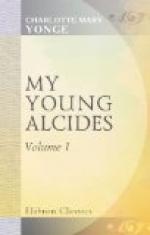Dermot went at last to consult the same doctor to whom, half a year before, he had taken Harold; and it was contrived that he should see and hear her at a dinner-party without her knowledge. He consoled us very much by saying that her mind was not touched, and that it was a fever on the nerves, produced by the never having succumbed to the unhappiness and the shock which, when he heard in what manner she had lost Harold, he considered quite adequate to produce such effects. Indeed, he had been so much struck with Harold himself, that he was quite startled to hear of his death, and seemed to think an excess of grief only his due. He bade us take her to her home, give her no external excitement, and leave her as much as possible to go her own way, and let her feel herself unwatched, and, if we could, find her some new yet calming, engrossing occupation.
We took the advice, and poor Lady Diana besought us to remain with her for the present; nor, indeed, could we have left her. Our chief care was to hinder her oppressing her daughter with her anxiety; for we found that Viola was so jealous of being watched that she would hardly have tolerated us, but that I had real business in packing up my properties at Mount Eaton. For the first week she took up her old occupations in the same violent and fitful way, never sitting long to anything, but rushing out to dash round the garden, and taking long walks in all weathers, rejecting companionship.
>From various causes, chiefly Lady Diana’s wretchedness and anxiety, Dermot and I had to wait a week before we could have the pony-chaise and go together to Harold’s grave. The great, massive, Irish granite cross was not ready then, and there was only the long, very long, green mound, at my mother’s feet. There lay two wreaths on it. One was a poor thorn garland—for his own Hydriot children had, we heard, never left it untended all the winter—the other was of a great white-flowered rhododendron that was peculiar to the Arked garden.
Was it disloyal to Harry that we thought more of Viola than we did of him that first time we stood by his grave? It was an immense walk from Arked to Arghouse Church, over four miles even by the shortest way, which lay through rough cart-tracks which we had avoided in coming, but now felt we had better take.
Nearly half way home, under a great, old pollard ash, we saw a little brown figure. It was Viola, crouched together with her head on her knees, sitting on the bank. She started up and tried to say something petulantly joking about our always dogging her, but she broke down in a flood of tears to which sheer weariness conduced. She was tired out at last, footsore, and hardly able to move a limb, when Dermot almost lifted her into the carriage, the dreadful, hard self-control all over now, when, in those long lanes, with the Maybushes meeting overhead, she leant against me and sobbed with long-pent anguish, while her brother walked at the pony’s head.




